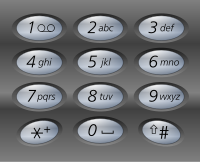给定一个仅包含数字 2-9 的字符串,返回所有它能表示的字母组合。答案可以按 任意顺序 返回。
给出数字到字母的映射如下(与电话按键相同)。注意 1 不对应任何字母。
示例 1:
输入:digits = "23" 输出:["ad","ae","af","bd","be","bf","cd","ce","cf"]
示例 2:
输入:digits = "" 输出:[]
示例 3:
输入:digits = "2" 输出:["a","b","c"]
提示:
0 <= digits.length <= 4digits[i]是范围['2', '9']的一个数字。
方法一:遍历
我们先用一个数组或者哈希表存储每个数字对应的字母,然后遍历每个数字,将其对应的字母与之前的结果进行组合,得到新的结果。
时间复杂度
class Solution:
def letterCombinations(self, digits: str) -> List[str]:
if not digits:
return []
d = ['abc', 'def', 'ghi', 'jkl', 'mno', 'pqrs', 'tuv', 'wxyz']
ans = ['']
for i in digits:
s = d[int(i) - 2]
ans = [a + b for a in ans for b in s]
return ansclass Solution {
public List<String> letterCombinations(String digits) {
List<String> ans = new ArrayList<>();
if (digits.length() == 0) {
return ans;
}
ans.add("");
String[] d = new String[] {"abc", "def", "ghi", "jkl", "mno", "pqrs", "tuv", "wxyz"};
for (char i : digits.toCharArray()) {
String s = d[i - '2'];
List<String> t = new ArrayList<>();
for (String a : ans) {
for (String b : s.split("")) {
t.add(a + b);
}
}
ans = t;
}
return ans;
}
}class Solution {
public:
vector<string> letterCombinations(string digits) {
if (digits.empty()) return {};
vector<string> d = {"abc", "def", "ghi", "jkl", "mno", "pqrs", "tuv", "wxyz"};
vector<string> ans = {""};
for (auto i : digits) {
string s = d[i - '2'];
vector<string> t;
for (auto& a : ans) {
for (auto& b : s) {
t.push_back(a + b);
}
}
ans = move(t);
}
return ans;
}
};func letterCombinations(digits string) []string {
ans := []string{}
if len(digits) == 0 {
return ans
}
ans = append(ans, "")
d := []string{"abc", "def", "ghi", "jkl", "mno", "pqrs", "tuv", "wxyz"}
for _, i := range digits {
s := d[i-'2']
t := []string{}
for _, a := range ans {
for _, b := range s {
t = append(t, a+string(b))
}
}
ans = t
}
return ans
}/**
* @param {string} digits
* @return {string[]}
*/
var letterCombinations = function (digits) {
if (digits.length == 0) {
return [];
}
let ans = [''];
const d = ['abc', 'def', 'ghi', 'jkl', 'mno', 'pqrs', 'tuv', 'wxyz'];
for (const i of digits) {
const s = d[parseInt(i) - 2];
const t = [];
for (const a of ans) {
for (const b of s) {
t.push(a + b);
}
}
ans = t;
}
return ans;
};public class Solution {
public IList<string> LetterCombinations(string digits) {
var ans = new List<string>();
if (digits.Length == 0) {
return ans;
}
ans.Add("");
string[] d = {"abc", "def", "ghi", "jkl", "mno", "pqrs", "tuv", "wxyz"};
foreach (char i in digits) {
string s = d[i - '2'];
var t = new List<string>();
foreach (string a in ans) {
foreach (char b in s) {
t.Add(a + b);
}
}
ans = t;
}
return ans;
}
}const map = {
'2': ['a', 'b', 'c'],
'3': ['d', 'e', 'f'],
'4': ['g', 'h', 'i'],
'5': ['j', 'k', 'l'],
'6': ['m', 'n', 'o'],
'7': ['p', 'q', 'r', 's'],
'8': ['t', 'u', 'v'],
'9': ['w', 'x', 'y', 'z'],
};
function letterCombinations(digits: string): string[] {
const n = digits.length;
if (n === 0) {
return [];
}
const res = [];
const dfs = (i: number, str: string) => {
if (i === n) {
res.push(str);
return;
}
for (const c of map[digits[i]]) {
dfs(i + 1, str + c);
}
};
dfs(0, '');
return res;
}const map = {
'2': ['a', 'b', 'c'],
'3': ['d', 'e', 'f'],
'4': ['g', 'h', 'i'],
'5': ['j', 'k', 'l'],
'6': ['m', 'n', 'o'],
'7': ['p', 'q', 'r', 's'],
'8': ['t', 'u', 'v'],
'9': ['w', 'x', 'y', 'z'],
};
function letterCombinations(digits: string): string[] {
const n = digits.length;
if (n === 0) {
return [];
}
const dfs = (i: number, ss: string[]) => {
if (i === n) {
return ss;
}
const t = [];
for (const c of map[digits[i]]) {
for (const s of ss) {
t.push(s + c);
}
}
return dfs(i + 1, t);
};
return dfs(1, map[digits[0]]);
}use std::collections::HashMap;
impl Solution {
fn dfs(
i: usize,
s: &mut String,
cs: &Vec<char>,
map: &HashMap<char, String>,
res: &mut Vec<String>,
) {
if i == cs.len() {
res.push(s.clone());
return;
}
for c in map.get(&cs[i]).unwrap().chars() {
s.push(c);
Self::dfs(i + 1, s, cs, map, res);
s.pop();
}
}
pub fn letter_combinations(digits: String) -> Vec<String> {
let mut res = vec![];
if digits.is_empty() {
return res;
}
let mut map = HashMap::new();
map.insert('2', String::from("abc"));
map.insert('3', String::from("def"));
map.insert('4', String::from("ghi"));
map.insert('5', String::from("jkl"));
map.insert('6', String::from("mno"));
map.insert('7', String::from("pqrs"));
map.insert('8', String::from("tuv"));
map.insert('9', String::from("wxyz"));
Self::dfs(
0,
&mut String::new(),
&digits.chars().collect(),
&map,
&mut res,
);
res
}
}impl Solution {
fn dfs(i: usize, digits: &[u8], map: &Vec<Vec<char>>, s: &mut String, res: &mut Vec<String>) {
if i == digits.len() {
res.push(s.clone());
return;
}
for c in map[(digits[i] - b'2') as usize].iter() {
s.push(*c);
Self::dfs(i + 1, digits, map, s, res);
s.pop();
}
}
pub fn letter_combinations(digits: String) -> Vec<String> {
if digits.is_empty() {
return Vec::new();
}
let digits = digits.as_bytes();
let map = vec![
vec!['a', 'b', 'c'],
vec!['d', 'e', 'f'],
vec!['g', 'h', 'i'],
vec!['j', 'k', 'l'],
vec!['m', 'n', 'o'],
vec!['p', 'q', 'r', 's'],
vec!['t', 'u', 'v'],
vec!['w', 'x', 'y', 'z'],
];
let mut res = Vec::new();
Self::dfs(0, digits, &map, &mut String::new(), &mut res);
res
}
}
